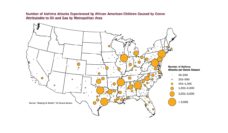For children who grow up with asthma, adolescence is the time to learn to manage their own care. This new responsibility comes with shifting social contexts and stressors which aren’t the same for all adolescents. Stress is more pronounced for those growing up in low-income, urban households. While the racial disparities associated with asthma rates have been well-documented, specific ways adolescence changes asthma management are less studied.
To better understand how adolescent stress affects asthma, Samantha Miadich and colleagues measured how a range of stressors specific to urban life changed asthma control, asthma-related emergency department visits, and self-reported quality of life. They collected this data from 61 asthmatic adolescents between the ages of 13 and 17 living in urban areas (93% black) and their caregivers.
Asthma control is dictated by the environments in which children live. Presently, an unhealthy environment for persons with asthma is thought of a neighborhood with high levels of pollution or a home full of asthma irritants, like mold or roaches. But Miadich’s team wanted to expand this definition of unhealthy by measuring how factors beyond the physical environment change asthma and asthma control in urban settings. They sought to measure how urban neighborhoods contributed to adolescent stress and whether this stress changed asthma management.
This data demonstrates that stress affects asthma management earlier for adolescents just learning about how to handle a serious and life-threatening illness.
Miadich’s team considered the stressors of poverty, perceived neighborhood safety, school-related stress, peer pressure, and caregiver-adolescent conflict. The researchers associated lower quality of life, worse asthma control, and more asthma-related emergency department visits with adolescents who faced greater stressors in urban life. Individually, each stressor worsened asthma control.
Three reasons explain the effects of urban life stressors on adolescent’s management of their asthma, according to the researchers. The first is that stress is associated with the dysregulation of the immune system, with direct clinical effects on health. The second is that stress may change health behavior, making adolescents more willing to make risky decisions, for instance, skipping doses of asthma medication. The third is that stress directly weighs on the mental health of both adolescents and their caregivers, which itself may cause asthma exacerbations.
Stress is sometimes thought of as something that accumulates over a lifetime and erodes health in older age. This data demonstrates that stress affects asthma management earlier for adolescents just learning about how to handle a serious and life-threatening illness.
Photo via Getty Images














